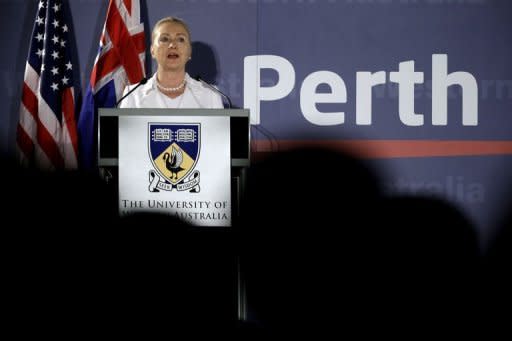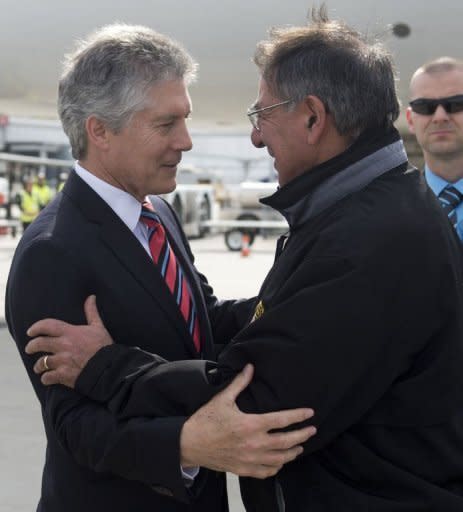US says shift to Asia 'real' as Australia hosts talks
The United States insisted Tuesday that its much-touted shift to the Asia-Pacific region is for real as US and Australian officials met for annual strategic talks. US Pentagon chief Leon Panetta told reporters before flying into Perth that the Americans were ready to follow through on a plan to pivot to the Pacific despite crises in the Middle East and fiscal strains at home. "The rebalance is real. It's going to be long-term," Panetta said. The United States is expanding military exercises with allies and gradually moving its most advanced ships, weaponry and aircraft to Asia -- including deploying Marines to northern Australia -- as part of a long-term strategy, he said. But that did not mean having to scale back its military presence in the volatile Middle East, he added, on his third trip to Asia since June. Speaking at the University of Western Australia in Perth, US Secretary of State Hillary Clinton underlined America's "expanding engagement" in the region. "It's important that we make absolutely clear we are here to stay," she said, adding that it was important to see India become more involved in the region and the US would welcome Australia-India joint naval exercises in the future. And she also said the US supports the peaceful rise of China, her comments coming as the Communist Party undergoes a once-in-a-decade leadership transition. "(We) hope to see gradual but consistent opening up of a Chinese society and political system that will more closely give the Chinese people the opportunities that we in the United States and Australia are lucky to take for granted," she said. In what could be her final visit Down Under in her current job, Clinton joined Panetta for talks with Australian counterparts Bob Carr and Stephen Smith. Prime Minister Julia Gillard described the two countries as "good mates at every level". But a widening sex scandal in Washington involving former CIA director David Petraeus threatened to overshadow the meeting, as fresh revelations linked the NATO commander in Afghanistan, General John Allen, to a key figure in the case. The talks in Perth are expected to focus on regional security and greater American use of Australian military facilities, particularly increased access to a key naval base south of Perth as the Indian Ocean rim region grows in strategic importance. The talks follow the arrival of about 250 US Marines in northern Australia this year as part of an American "rebalance" towards the Pacific after a decade of ground wars in Iraq and Afghanistan. The US military currently has only a limited footprint in longstanding ally Australia, including the Pine Gap Joint Defence Facility spy station near Alice Springs. The move to station Marines here -- some 2,500 by 2016-17 -- represents a significant strategic shift by Washington and has irked Beijing, whose rapid rise is behind the US recalibration of forces to Asia. A senior US defence official said the Pentagon would like to "keep the ball moving" on the deployment of the Marines as well as air force crews, hoping to slightly expand the number of boots on the ground. The four ministers also plan to discuss more detailed plans on troop levels in Afghanistan as the 2014 deadline approaches for a withdrawal of most foreign combat forces. But Clinton and Panetta will be faced with questions over the commander of NATO-led troops in Afghanistan, Allen, and whether he stay in the job. The Marine general is under investigation by the Pentagon inspector-general for potentially "inappropriate" emails to a woman, Jill Kelley, a Florida socialite. She had previously complained to the FBI about threatening messages that were later traced to the CIA director's lover. Gillard planned to host a dinner for Clinton and Panetta Tuesday and said the talks would touch on Afghanistan, the civil war in Syria and Iran's nuclear programme. "These talks will also deal with discussing what President (Barack) Obama and I agreed last year about military cooperation between our two countries," she added. "Last year President Obama and I announced that we had agreed that US Marines would be training on deployment in the Northern Territory. These talks will stocktake that progress and further defence cooperation."




